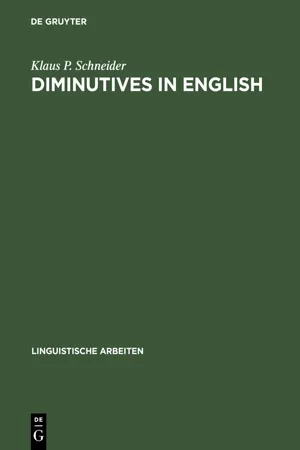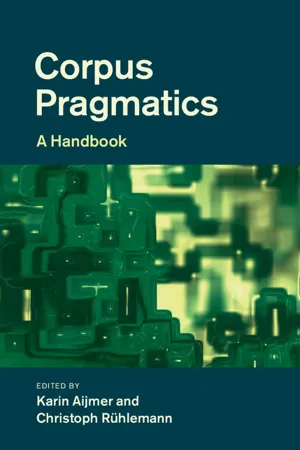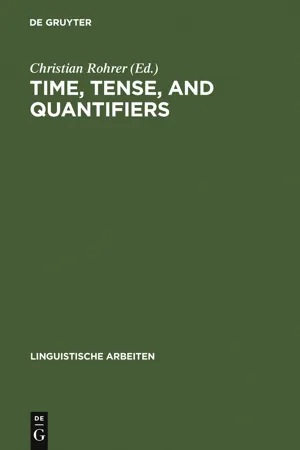Languages & Linguistics
Commissives
Commissives are a type of speech act that commit the speaker to a future course of action or state of affairs. They are typically used to make promises, threats, or offers, and are characterized by the speaker's intention to perform the action in the future. In linguistics, commissives are studied as part of the broader field of speech act theory.
Written by Perlego with AI-assistance
Related key terms
1 of 5
7 Key excerpts on "Commissives"
- eBook - PDF
- Klaus P. Schneider(Author)
- 2012(Publication Date)
- De Gruyter(Publisher)
by a 'world-to-words' fit (Searle 1976). Both types of acts refer to future events (cf. 179 Edmondson/House 1981) and both concern obliging one interactant to bring about these future events. 30 While directives refer to future actions to be performed by the hearer, Commissives refer to future actions by the speaker. The communicative point of commis-sive acts can be glossed as 'The speaker commits herself/himself to doing something' (Schneider 1988: 62; cf. Searle/Vanderveken 1985). Further differentiations can be based on the pragmatic scale of cost and benefit (Leech 1983). In the case of directives, the future action is at a cost to the hearer (House/Kasper 1987: 1254). By contrast, it is at a cost to the speaker in the case of Commissives. The rele-vant politeness maxims which refer to the cost-benefit scale and apply to Commissives and directives alike are the maxims of tact and generosity (Leech 1983: 132). TACT MAXIM: (a) 'Minimise cost to other' / (b) 'Maximise benefit to other' GENEROSITY MAXIM: (a) 'Minimise benefit to self / (b) 'Maximise cost to self The (b)-versions (maximisation) are more relevant to Commissives, and the (a)-versions (minimisation) more relevant to directive acts (cf. also Leech 1983: 109f.). In his speculations about the origins of language, Wunderlich (1978: 79f.) considers vocatives and directives the two most fundamental illocutionary types. Correspondingly, Commissives must have developed later, probably in response to directives, in cases where the addressees of the directives were not able or willing to perform the required action at once. In such cases, the addressees react verbally by accepting the obligation to perform the action in question at a later point in time. From this perspective, directives are primarily initiative interactional moves, while Commissives are primarily reactive. Accordingly, pro-totypical commissive acts are promises. - eBook - PDF
- Mikhail Kissine(Author)
- 2013(Publication Date)
- Cambridge University Press(Publisher)
(9) ? I promise to possibly attend the meeting. 6.3 Explaining the commitment The correct intuition behind the semantic solution dismissed in the previous section is that there is a connection between predictions about the future and commissive force. In fact, Commissives are assertions about the future, but assertions provide S with a reason to act. I will now discuss this claim step by step in order to show how it explains the commitment generated by promises. 6.3.1 Commissives versus first-person directives A good start is to contrast directive and commissive speech acts. There exist first-person plural directives, like (10). (10) Let’s write a paper together. It might be tempting to treat Commissives as first-person singular equivalents of such ‘collective’ directives. The idea would be that by her utterance of (10) S commits herself to bringing about the truth of the propositional content exactly in the same way as when she promises ‘I will write a paper’. Yet, there are clear differences between first-person plural directives and commis- sives (cf. Hamblin, 1987: 36–9). A successful promise creates an obligation to keep it from the very moment of its utterance; directives, by contrast, create an obligation to comply only if the addressee accepts it. With first-person plural directives, the addressee is a group that includes S; but the potential obligation to bring about the truth of the propositional content is conditional on the acceptance by the whole group. 3 Thanks to Philippe De Brabanter for sending me this example. 4 (8) is acceptable under a non-commissive reading, irrelevant here, where ‘I promise’ means ‘I affirm, I tell the truth’. 154 Commissive speech acts In some languages, such as French, morphological imperative extends to first-person plural, and it is this form that is prototypically used in first-person plural directives. - eBook - PDF
- Carla Vergaro(Author)
- 2018(Publication Date)
- Peter Lang Group(Publisher)
125 Chapter 4. Commissive shell nouns 1 4.1 Introduction Commissive shell nouns report commissive speech acts. An example of this type of shell noun in one of the constructions in which it occurs is shown in (1). (1) Meanwhile in Lebanon, Moslem extremists holding three American hostages renewed their threat to kill them and summarily dismissed recent hints that the hostages might be released. Pattern: noun followed by to-infinitive (N-to inf) Commissive speech acts are defined by Searle (1976: 11–12) as acts whose point is to commit the speaker, in varying degrees, to some future course of action. The direction of fit is world to words and the sincerity condition is that the speaker has the intention to do the act. From the theoretical point of view, research on commissive speech acts has mainly concentrated on promises, focusing on the normative effects that promises create (see Ambroise 2013 for a thorough overview). Thus, for Searle (1969: 57–64), the normative character of promises is determined by the sincere intention the speaker entertains in promising, with words and circumstances of the utterance that do not play a determining role in the efficiency of the promise. More recent approaches to the analysis of promises take a more conventionalist stance and analyze how the socially binding character of promising is created, at the same time highlighting the necessity to compare promises with other commissive speech acts to understand the way the complex network of illocutionary forces is modulated. Let us 1 This chapter is a revised and expanded version of an article, coauthored with Hans-Jörg Schmid (Ludwig-Maximilians-Universität München), published in Pragmatics & Cognition (2017), 24/1, 91–118 . I am grateful to Hans-Jörg Schmid and to Benjamins for the per- mission to use parts of it for the purpose of this book. - eBook - PDF
- Marina Sbisà, Ken Turner, Marina Sbisà, Ken Turner(Authors)
- 2013(Publication Date)
- De Gruyter Mouton(Publisher)
But this does not make a tax-onomy that groups speech acts like orders and promises together attractive. A potential argument for grouping Commissives and directives together is the existence of first-person plural directives, like “Let’s write a paper”. The idea would be that in such cases by her utterance S commits herself to bring about the truth of the propositional content exactly in the same way as when she promises “I will write a paper”. Yet, there are clear differences between first-person plural directives and Commissives (cf. Hamblin 1987: 36–39). A successful promise cre-ates an obligation to keep it from the very moment of its utterance; directives, by contrast, create an obligation to comply only if the addressee accepts it. With first-person plural directives, the addressee is a group that includes S; but the potential obligation to bring about the truth of the propositional content is conditional on the acceptance by the whole group. Moreover, self-directed commands are linguisti-cally distinct from Commissives. In English, I can exhort myself to finish the paper by saying either “Let me finish this paper now” or “Finish this paper now”; but none of these forms would be adequate to promise you to finish the paper. 13 In order to distinguish between directives and Commissives, Searle (1975b) includes sincerity conditions within his classificatory criteria. According to Searle (1969), sincerity conditions of an illocutionary act X specify which mental state S commits herself to having by her performance of X. The idea is intuitive enough. By asserting that p , S commits herself to believing that p ; by ordering A to do p , S commits herself to desiring that A do p ; by promising to do p , S commits herself to having the intention to do p . - eBook - PDF
Corpus Pragmatics
A Handbook
- Karin Aijmer, Christoph Rühlemann(Authors)
- 2014(Publication Date)
- Cambridge University Press(Publisher)
Among other things, Arnovick deals with the pragmatic function of the speech act of so-called ‘gibberish’ (which is treated as a spirit code effecting a kind of word magic) and the invocation of saints (which involves their role as Germanic warriors in poetry as well as their role in calendars and litanies). Alonso-Almeida and Cabrera-Abreu (2002) analyse promises in efficacy phrases (that is, sections which guarantee the effectiveness of a recipe) in a small number of medieval recipes in the context of relevance theory. Rudanko (2004) deals with threats in Chaucer ’s wooing scenes. Busse (2008) analyses the inventory of directive speech acts in Sha- kespeare’s King Lear. Here the frequency and distribution of the different manifestations of directives can help to trace the development of the protagon- ist of the play (on questions and requests in Othello and Coriolanus, see Rudanko 1993). Del Lungo Camiciotti (2008) investigates directive and com- missive speech acts 1 in a collection of model letters from a nineteenth-century letter-writing manual, containing actual business letters the compiler edited for didactic purposes. Here she can show that the directive speech acts are 1 Commissive speech acts commit the speaker to some future course of action (e.g. promises, threats). Speech acts: a diachronic perspective 57 expressed fairly directly, with standard formulas of mitigation; similarly the Commissives are also rather explicit and direct. This enumeration nicely illustrates the limitations but also some advantages of research associated with illustrative eclecticism from a corpus perspective. First of all, these studies can hardly be called ‘corpus-based’ in the strict sense of the word. The data used serve as a convenient repository for illustrat- ing the analyses but not as primary and representative evidence for proving a hypothesis. - eBook - PDF
Time, Tense, and Quantifiers
Proceedings of the Stuttgart Conference on the Logic of Tense and Quantification
- Christian Rohrer(Author)
- 2011(Publication Date)
- De Gruyter(Publisher)
Secondly, whereas the rules of the assertion game allow an addressee to ask the assertor for a justification of his claim, a request for such a defence would seem inappropriate in response to a promise. Thirdly, truth seems to play different roles in assertions and promises. It makes sense to enquire whether what has been asserted in a given speech act is true, but it does not seem to make sense to enquire whether what has been promised in a given speech act is true. In case of a promise, questions of truth seem to 4 arise just with respect to standard preconditions. It seems, then, reasonable to adopt the obligation conception of promise and other Commissives, which gives us the first kind of linguistic commitments. The constitutive rules of promising are part of our language, and accordingly their standard products are linguistic. Since the rules of promising establish a commitment on the part of the speaker, when he plays his role in the language-game they define, the commitments made by promising are linguistic commitments. Using the common distinction between the force of a speech act and its prepositional part (sense, radical), it would be natural to ascribe commitments of the first type to the forces of the commissive speech acts in-volved. The force of such a speech act fixes a scheme of commitment, a function from propositions to commitments, if you wish. Given the prepo-sitional part of a promise, the force of promising determines the prirm facie obligation undertaken. I will call commitments of the first type force comiitments. For some arguments against the opposite view (of D.Lewis, for example, in his General Semantics, in: Semantics of Natural Language (eds., D.Davidson and G.Harman) Reidel, Dordrecht 1972, pp.169-218), see our Mood Implicatures, Theoretical Linguistics 1 (1974), pp.6-38. 211 Before we turn to other types of commitment, let me sketch a way of re-presenting such commitments in a theory of language. - eBook - PDF
- Ingo Plag, Maria Braun, Sabine Lappe, Mareile Schramm(Authors)
- 2009(Publication Date)
- De Gruyter Mouton(Publisher)
It is an ‘exclamatory sen-tence’, i.e. a sentence beginning with what or how which function as modi-fiers within a noun phrase or an adjectival phrase. Quite often, exclamatory sentences do not contain any verb. They are typically used to signal speakers’ emotions. Another crucial aspect conveyed in (4) is the speaker’s communi-cative intention. Evidently, the intention the speaker wants to express through (4) is to pay a compliment. Quite often, the performance of a certain act does not end with uttering a sentence. Consider what might happen after you have uttered the sentence in (4). Your aunt, whom we assume to be a polite person, would most likely react to it by, for example, saying something like “Oh, thank you.” or by of-fering you some more of her apple pie. Another possibility is that she just says nothing because she might not be listening to you but to your younger sister right at the moment. This means, then, that in addition to the linguistic form and the communicative intention there is one more aspect of speech acts that is of interest to us: what reaction, if any, they cause in the hearers. The three aspects of speech acts we have just explored are an intrinsic part of Speech Act Theory, and each of them is given a special term. The term locution is used to refer to the linguistic form of a speech act. The communi-cative intention rendered by the speaker, such as promising, commanding, making complements, etc. is called illocution or ‘illocutionary force’. Fin-ally, the effect produced on the hearer is termed perlocution . Note that the term ‘speech act’ is also used by some linguists to refer solely to the illocution since the illocution is the most crucial part of a speech act. 180 Studying language in use: pragmatics You might have noticed that there are many different terms used to refer to speakers’ intentions: communicative intention, communicative purpose, in-tended meaning, implied meaning, illocution, illocutionary force.
Index pages curate the most relevant extracts from our library of academic textbooks. They’ve been created using an in-house natural language model (NLM), each adding context and meaning to key research topics.






